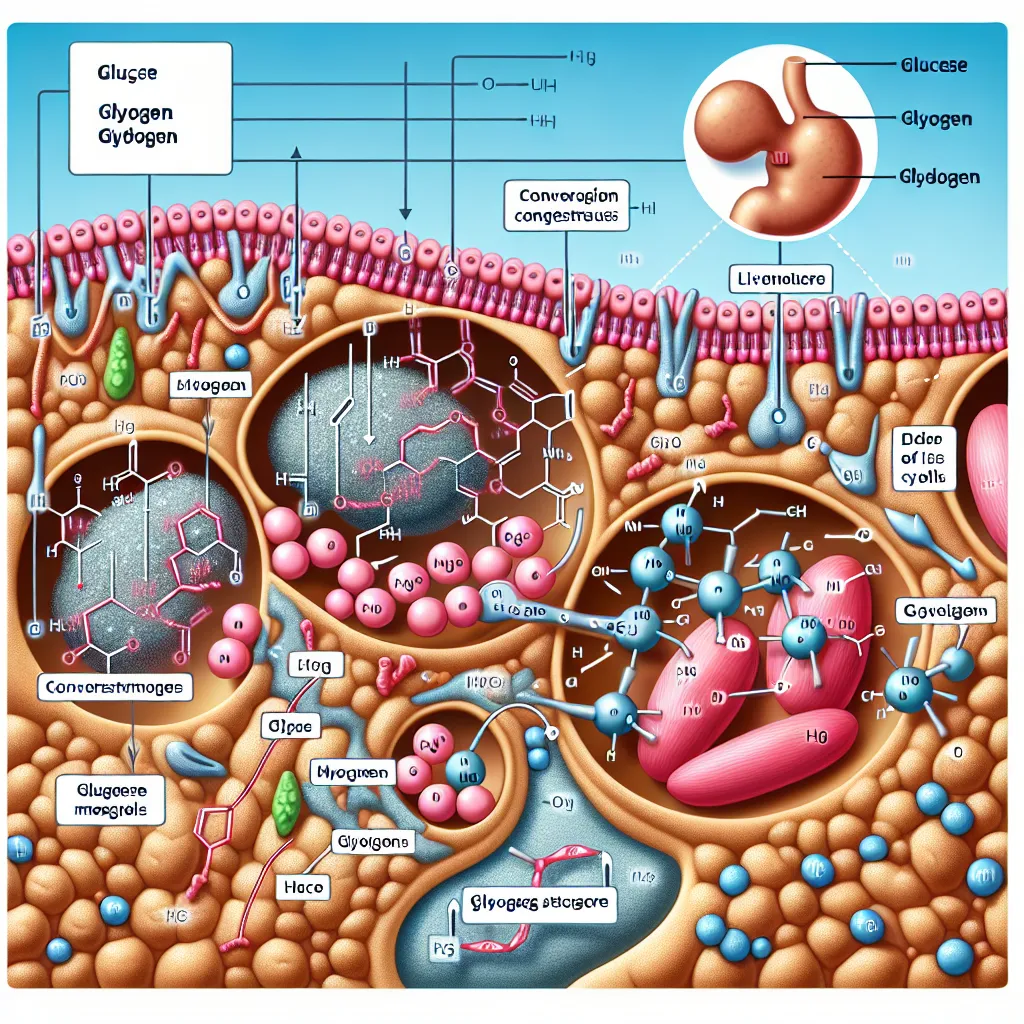Definition: Glycogen stores refer to the form in which glucose is stored in the body, primarily in the liver and muscles.
Nội dung bài viết
- Understanding the Context of ‘Glycogen Stores’
- Examples in Context
- Common Contexts
- Frequency in IELTS
- Analyzing ‘Glycogen Stores’
- Word Structure
- Synonyms and Related Terms
- Memorization Techniques for ‘Glycogen Stores’
- Mind Mapping
- Mnemonic Story
- Practical Application of ‘Glycogen Stores’
- IELTS Practice Tasks
- Repetition and Review
- Conclusion
Part of Speech: Noun phrase
Pronunciation: /ˈɡlaɪkəʊdʒən stɔːz/

Understanding the Context of ‘Glycogen Stores’
Examples in Context
-
Glycogen stores are depleted during intense physical exercise, requiring replenishment through carbohydrate intake.
- This sentence demonstrates the relationship between physical activity and glycogen depletion.
-
Athletes often focus on maximizing their glycogen stores before a competition to enhance endurance.
- Here, we see the importance of glycogen in athletic performance.
-
The body’s glycogen stores play a crucial role in maintaining blood glucose levels between meals.
- This example highlights the metabolic function of glycogen in blood sugar regulation.
-
Fasting for extended periods can significantly reduce glycogen stores, leading to fatigue and decreased mental clarity.
- This sentence illustrates the impact of dietary habits on glycogen levels and overall well-being.
-
Understanding how to manage glycogen stores is essential for both athletes and individuals managing diabetes.
- This example broadens the relevance of glycogen knowledge to different groups of people.
Common Contexts
‘Glycogen stores’ is frequently encountered in discussions about:
- Sports nutrition and performance
- Metabolism and energy balance
- Diabetes management
- Nutrition science
- Exercise physiology
Frequency in IELTS
While ‘glycogen stores’ is not a high-frequency term in IELTS, it may appear in:
- Reading passages on health, nutrition, or sports science (Academic module)
- Listening sections discussing athletic performance or medical topics
- Writing Task 2 essays on health and fitness trends
- Speaking Part 3 when discussing sports, diet, or health-related topics
Analyzing ‘Glycogen Stores’
Word Structure
- Glycogen: derived from ‘glyco-‘ (related to sugar) + ‘-gen’ (producing)
- Stores: plural form of ‘store’, indicating multiple storage sites or quantities
Synonyms and Related Terms
- Carbohydrate reserves
- Glucose storage
- Energy deposits
- Muscle glycogen
- Liver glycogen
Memorization Techniques for ‘Glycogen Stores’
Mind Mapping
Create a mind map with ‘Glycogen Stores’ at the center, branching out to:
- Location (liver, muscles)
- Function (energy storage, blood sugar regulation)
- Related concepts (carbohydrate loading, endurance)
- Factors affecting levels (diet, exercise, fasting)
Mnemonic Story
Imagine a “Glyco-Gen Store” where athletes shop for energy. The shelves are stocked with little glucose molecules, ready to be packed into muscles and liver for later use. This store opens during meals and closes during exercise, helping you remember the cycle of glycogen storage and depletion.
Practical Application of ‘Glycogen Stores’
IELTS Practice Tasks
-
Writing Task 2 Sample Question:
Some people believe that a high-carbohydrate diet is essential for athletic performance, while others argue that a low-carbohydrate diet is more beneficial. Discuss both views and give your opinion.In your response, consider incorporating ‘glycogen stores’ to demonstrate your understanding of the topic:
“Proponents of high-carbohydrate diets argue that they are crucial for maintaining adequate glycogen stores, which are essential for endurance and high-intensity performance. On the other hand, advocates of low-carbohydrate diets claim that reducing carbohydrate intake can improve the body’s ability to utilize fat for energy, potentially preserving glycogen stores for when they are most needed.”
-
Speaking Part 3 Practice:
Question: How do you think diet affects athletic performance?Sample Answer: “Diet plays a crucial role in athletic performance, particularly in how it affects an athlete’s glycogen stores. Consuming the right balance of carbohydrates helps to maximize these stores, which are essential for providing energy during intense physical activity. Athletes who fail to maintain adequate glycogen stores may experience fatigue and decreased performance, highlighting the importance of proper nutrition in sports.”
Repetition and Review
To effectively memorize and use ‘glycogen stores’:
- Create flashcards with the term, its definition, and example sentences
- Review the concept in different contexts (sports, health, biology)
- Practice using the term in discussions about nutrition and exercise
- Relate it to personal experiences with diet and physical activity
Conclusion
Understanding ‘glycogen stores’ is valuable not only for IELTS success but also for general knowledge about health and fitness. This term bridges concepts in nutrition, physiology, and athletic performance, making it a versatile addition to your vocabulary. Remember to practice using it in context, whether in writing tasks, speaking exercises, or everyday conversations about health and sports.
We encourage you to share your experiences with learning and using this term in the comments section below. How might you incorporate ‘glycogen stores’ into a discussion about health or fitness? Your insights could help fellow learners master this concept for their IELTS preparation and beyond.
To further expand your IELTS-related vocabulary, you might find our article on carbohydrate loading helpful, as it closely relates to the concept of glycogen stores in athletic performance.